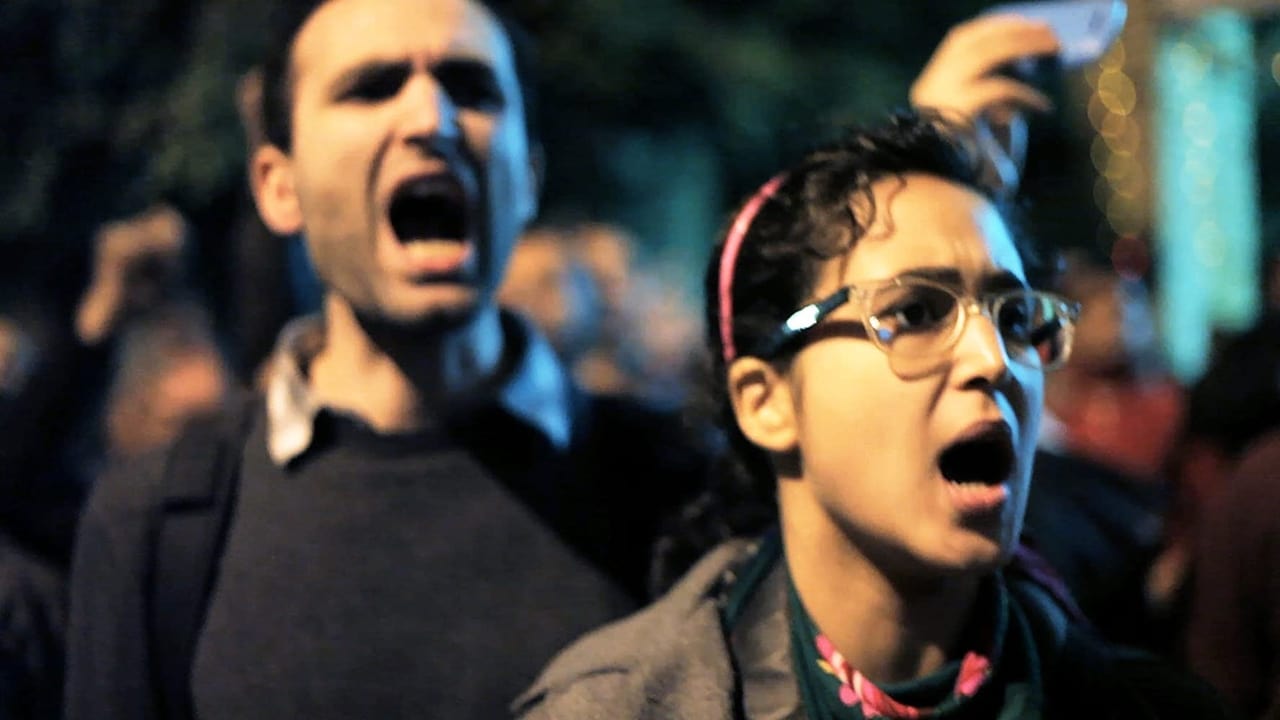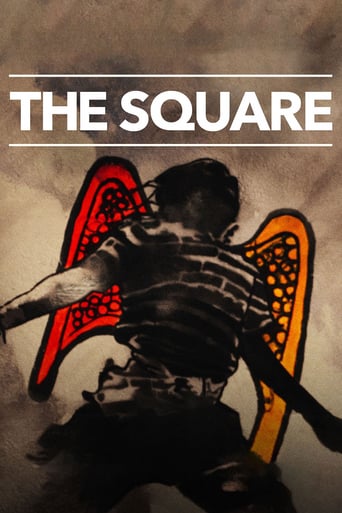

The Square is about an Egyptian Uprising. They want a new government with a new President. People should watch this to learn about what's happening around the world that a lot of us don't know about. The Square is about Egyptians living in Poverty, Injustice, and Corruption. What happens is the public protests in Tahrir Square (you don't have freedom of speech in Egypt) and is able to have President Mubarak step down. The public has completely filled Tahrir Square and the Military steps in to try and control it and then all heck breaks loose. I liked how dedicated these people are for fighting for what they believe in. I recommend this documentary to anybody who cares about what's going on around the world.
... View More"The leaders play on top. The people pay the price for everything. The people always pay the price." To commemorate the one-year anniversary of the political uprising and tragic bloodshed of an African nation demanding a justified revolution, this review will cover the inspirational, immersive and intense film known as 'Al-Midan' (The Square). However, did this documentary exceed in truly capturing the essence of a nation in one of its most dire eras? Let's take a look.Directed by Jehane Noujaim (Control Room), this 2013 Egyptian-American documentary depicts the ongoing roller-coaster ride of tumultuous political affairs, deriving from its roots back in 2011 in Tehrir Square to the summer of 2013. Casting its ballot of a budget at only $1.5 million, the unfortunate outcome was a return only slightly more than a tenth of that at the box office. However, the film did receive a nomination for the Academy Award for Best Documentary Feature at the 86th Academy Awards and was the first film through Kickstarter (crowd-sourced) to do so. That may have been thanks to the five editors who worked on the film as well, not to mention the five "additional editors" and six assistant editors mentioned in the end credits, but who's counting? The Revolution in Egypt has been a continuing political drama over the past two and a half years. For most people, the news will only provide a glimpse of one of the bloodiest political battles, an election and a million man march. The handful of characters we do meet at the start of the uprising revolution discuss covering their own footage with cameras, as the news will only show so much. These maneuvers and a number of YouTube videos are our main characters' only windows of the outside world around them gone hellishly awry; ravenous for rightful restitution amidst streets slathered with rioters, tanks and tear gas. The characters we are introduced to are only a fraction of the tens of hundreds of thousands fighting for their voices to be heard in claiming their rights, including actor Khalid Abdalla (United 93) during the reign of the corrupt Muslim Brotherhood and the leering presence of the threatening Revolutionary. At the beginning of the film, we witness the deposal of the fourth president, Hosni Mubarak, after his nearly two-decade long term. Now, political unrest has arisen and the people demand a new leader. When President Mohamed Morsi wins the election as the fifth president of Egypt, his abrupt term is halted after he grants himself unlimited powers on the pretext that he will "protect" the nation from the Mubarak-era power structure. He also gives himself the power to legislate without judicial oversight or review of his acts. In late November, he issues an Islamist-backed draft constitution and calls for a referendum, an act that his opponents call an "Islamist coup". These issues, along with complaints of prosecutions of journalists and attacks on nonviolent demonstrators, brings hundreds of thousands of protesters to the streets in the 2012 Egyptian protests. It is these actions that erupt the nation into frenzy, with protesters by the millions calling for the resignation of Morsi. He is later tried for charges of incitement of murder and violence, along with espionage. As of now, the nation is hopefully awaiting a new leader who will indefinitely bring about peace and rest once again to the nation of Egypt.'The Square' indeed does this daring documentary justice in capturing the raw, uncut footage and bringing it to vivid life not only as a picture of grueling chaos but also as an art form. Like the cuts to the mural of the wall in the film being painted every now and then, so too are the voices of the people in Tehrir Square in all of their varying colors. Many voices, one plea. Many colors, one portrait. Together the people forget their differences and stand as one by the thousands upon thousands to form their own "wall" that stands against the powers polluting their precious homeland. No matter how many "bricks" are lost from their wall, the people are all the stronger in their fight. The shots of a man's stretched, distorted face upon it being run over from a panzer or a young man assassinated for attending the protest without informing his parents first are daunting and grotesque, but they emphasize the desperation of a people seeking freedom. Even one of our main characters, Ahmed Hassan, gets a gash in his head from some rocks thrown at him. Some up-close shots in the film show the paint running in the heat down the wall, paralleling the people in the street sacrificing their blood for a dream they so desperately believe in. With each stroke of a brush, they too are painting the way on a path toward a democratic society and a brighter future. Like the mural, though unfinished, the revolution is a process, and getting there will be a long journey.Astonishingly intimate, courageous, complex and relentlessly gripping, Noujaim succeeds in risking a few years of her life to chronicle a giant mark in world history that is shown as deeply upsetting as it is yet ultimately hopeful to the viewer amidst an ever-shifting political culture. The two-year look at history in less than two hours is hard to digest at first but satisfactorily sums up a truly complicated and twisted predicament that one can only applaud afterward.
... View MoreTHE SQUARE is a raw, uncompromising documentary charting the Egyptian revolution that began with the overthrowing of Pressident Mubarak, and continues to this day. President Morsi was elected and overthrown; and the people are perpetually at war with one another. The film tells the stories that have often been neglected with the reporting of the conflict in the western media. Using five different people of different ages and different backgrounds as their subjects, director Jehane Noujaim shows the spontaneity of the so-called "Arab Spring" - it began as a popular movement among young people and continues in similar vein to this day. They are not only frustrated with the established forces of government, as well as the army, but they are searching for a more democratic form of living. Despite repeated - and often violent - attempts to suppress them, their will to resist remains unshakable. The film includes several violent sequences attesting to the brutality of the army's treatment of the revolutionaries. What gives THE SQUARE its true originality, however, is its refusal to be constrained within western-inscribed intellectual boundaries. Revolutions are supposed to be decisive, with one government supplanted by another; this film shows that the revolution in Egypt is a long one, and is still by no means concluded. The actor Khalid Abdalla, one of the main protesters, makes this point; after two years, certain reforms have been achieved, but the protests need to continue long-term. Revolutions are also supposed to be about ideology - the Russian Revolution, for instance, helped usher in communist rule. In Egypt, as with other countries in the region, the protesters don't necessarily have a coherent ideology (even though their concerns are obviously ideological); they are just looking for a form of government in which their voices can be heard. And perhaps most importantly, the subject-matter of THE SQUARE is not just about Egypt, but can also apply to other countries who have experienced similar protests - Tunisia, Syria and Turkey. If filmgoers want to learn more about the consequences of the so-called "Arab Spring" (a term which has been embraced by the west, but seems to me misleading), they should watch this film. Essential viewing.
... View MoreGreetings again from the darkness. This is the third of this year's five Oscar nominated documentaries I have seen, and thanks to the historic Texas Theatre, I'll get to see the last two as well. This one is directed by Cairo born and Harvard educated Jehane Noujaim. She sets out to capture the Egyption Revolution, as part of the Arab Spring, and now in it's third year. This is a look from inside the core of the revolution, not a washed-over CNN report.It should first be noted that this revolution began as more of a protest. Citizens just fed up with the Mubarek regime began congregating in Tahrir Square in hopes of influencing change and a transition to a society of conscience. Ms. Noujaim and her multitude of cameras follows a hand full of these protesters and the changes that occur inside the revolution. These changes occur as Mubarek falls, the military takes over and betrays the movement, and then the Muslim Brotherhood takes control when Mohamed Morsi wins the election. This causes the loss of solidarity in the movement as it becomes clear that the Brotherhood consorted with the military to gain power, proving their mission was quite different.One of the faces of the revolution is Egyptian actor Khalid Abdalla who you might recognize from the fine 2007 film The Kite Runner. Abdalla speaks excellent English and is clearly passionate about the vision. His comments also drive home the difference in a protest and the politics of a true revolution. We only get a couple of on camera comments from government and military officials, but the real insight and spirit of the film is captured in the faces, words and actions of those involved in the sit-ins, despite the many violent attempts to shut them down.The most staggering visual comes from an aerial view of Cairo as the camera captures the masses as they descend on the streets during the third uprising that we see. It's breathtaking and in stark contrast to the news reports we saw in the U.S. Unfortunately, there is still no resolution in this as Egypt is still in flux and preparing for yet another election. That brings even more power to the "in the moment" point of view that this film delivers. http://moviereviewsfromthedark.com/
... View More